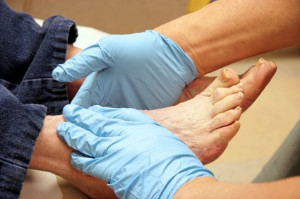 Plantar fasciitis is one of the most common causes of heel pain that podiatrists see in their patients. Plantar fasciitis involves the irritation or inflammation of the plantar fascia, which is a thick band of tissue located on the bottom of the foot that supports the arch and connects the heel to the toes. Irritation and inflammation typically occurs after overusing or overstretching the fascia, creating symptoms of pain. Wearing shoes that are not appropriate for the physical activities you engage in can also cause plantar fasciitis. Preventing plantar fasciitis involves properly stretching the feet and wearing shoes that suit the specific activities you may be performing that day.
Plantar fasciitis is one of the most common causes of heel pain that podiatrists see in their patients. Plantar fasciitis involves the irritation or inflammation of the plantar fascia, which is a thick band of tissue located on the bottom of the foot that supports the arch and connects the heel to the toes. Irritation and inflammation typically occurs after overusing or overstretching the fascia, creating symptoms of pain. Wearing shoes that are not appropriate for the physical activities you engage in can also cause plantar fasciitis. Preventing plantar fasciitis involves properly stretching the feet and wearing shoes that suit the specific activities you may be performing that day.
Plantar fasciitis can be very painful and inconvenient. If you are experiencing heel pain or symptoms of plantar fasciitis, contact Brent Harwood, DPM from Southeast Podiatry. Our doctor can provide the care you need to keep you pain-free and on your feet.
What Is Plantar Fasciitis?
Plantar fasciitis is the inflammation of the thick band of tissue that runs along the bottom of your foot, known as the plantar fascia, and causes mild to severe heel pain.
What Causes Plantar Fasciitis?
How Can It Be Treated?
While very treatable, plantar fasciitis is definitely not something that should be ignored. Especially in severe cases, speaking to your doctor right away is highly recommended to avoid complications and severe heel pain. Your podiatrist can work with you to provide the appropriate treatment options tailored to your condition.
If you have any questions please feel free to contact one of our offices located in Fairhope, Brewton, and Atmore, AL . We offer the newest diagnostic and treatment technologies for all your foot care needs.
Read more about Plantar Fasciitis With the approach of warmer weather, many children are gearing up and preparing for fair-weather sports such as softball and soccer. Regardless of the sport your child may be participating in, injuries are bound to occur. To help protect your child’s feet for the upcoming season, consider the following tips. Be sure to have protective tape available to wrap around the , as tape can help prevent or brace sprains or fractures. Be sure your child is wearing shoes appropriate for the sport he or she is participating in, as this can not only improve your child’s performance, but also protect him or her from injury.
With the approach of warmer weather, many children are gearing up and preparing for fair-weather sports such as softball and soccer. Regardless of the sport your child may be participating in, injuries are bound to occur. To help protect your child’s feet for the upcoming season, consider the following tips. Be sure to have protective tape available to wrap around the , as tape can help prevent or brace sprains or fractures. Be sure your child is wearing shoes appropriate for the sport he or she is participating in, as this can not only improve your child’s performance, but also protect him or her from injury.
Making sure that your children maintain good foot health is very important as they grow. If you have any questions, contact Brent Harwood, DPM of Southeast Podiatry. Our doctor can provide the care you need to keep you pain-free and on your feet.
Keeping Children's Feet Healthy
Having healthy feet during childhood can help prevent medical problems later in life, namely in the back and legs. As children grow, their feet require different types of care. Here are some things to consider...
Although babies do not walk yet, it is still very important to take care of their feet.
Avoid putting tight shoes or socks on his or her feet.
Allow the baby to stretch and kick his or her feet to feel comfortable.
As a toddler, kids are now on the move and begin to develop differently. At this age, toddlers are getting a feel for walking, so don’t be alarmed if your toddler is unsteady or ‘walks funny’.
As your child gets older, it is important to teach them how to take care of their feet.
Show them proper hygiene to prevent infections such as fungus.
Be watchful for any pain or injury.
Have all injuries checked by a doctor as soon as possible.
Comfortable, protective shoes should always be worn, especially at play.
If you have any questions please feel free to contact one of our offices located in Fairhope, Brewton, and Atmore, AL . We offer the newest diagnostic and treatment technologies for all your foot care needs.
Read more about What to Do to Keep Your Child’s Feet Healthy For people who live with diabetes, footcare should be high on the list of concerns related to overall health. Due to constricted blood flow or nerve damage, diabetics need to take extra care to avoid potential foot and leg injuries. Walking barefoot is not typically a good idea, as you may not feel it when you step on something sharp. Proper inspection is also very important. Be sure to check your legs and feet for any kind of sores or lesions. Gone unnoticed or untreated, these wounds can quickly become infected and lead to very serious consequences like amputation. Along with daily personal inspection, make sure you have your feet checked often by a podiatrist.
For people who live with diabetes, footcare should be high on the list of concerns related to overall health. Due to constricted blood flow or nerve damage, diabetics need to take extra care to avoid potential foot and leg injuries. Walking barefoot is not typically a good idea, as you may not feel it when you step on something sharp. Proper inspection is also very important. Be sure to check your legs and feet for any kind of sores or lesions. Gone unnoticed or untreated, these wounds can quickly become infected and lead to very serious consequences like amputation. Along with daily personal inspection, make sure you have your feet checked often by a podiatrist.
Diabetic foot care is important in preventing foot ailments such as ulcers. If you are suffering from diabetes or have any other concerns about your feet, contact Brent Harwood, DPM from Southeast Podiatry. Our doctor can provide the care you need to keep you pain-free and on your feet.
Diabetic Foot Care
Diabetes affects millions of people every year. The condition can damage blood vessels in many parts of the body, especially the feet. Because of this, taking care of your feet is essential if you have diabetes, and having a podiatrist help monitor your foot health is highly recommended.
The Importance of Caring for Your Feet
Patients with diabetes should have their doctor monitor their blood levels, as blood sugar levels play such a huge role in diabetic care. Monitoring these levels on a regular basis is highly advised.
It is always best to inform your healthcare professional of any concerns you may have regarding your feet, especially for diabetic patients. Early treatment and routine foot examinations are keys to maintaining proper health, especially because severe complications can arise if proper treatment is not applied.
If you have any questions please feel free to contact one of our offices located in Fairhope, Brewton, and Atmore, AL . We offer the newest diagnostic and treatment technologies for all your foot care needs.
Read more about How to Care for Diabetic Foot